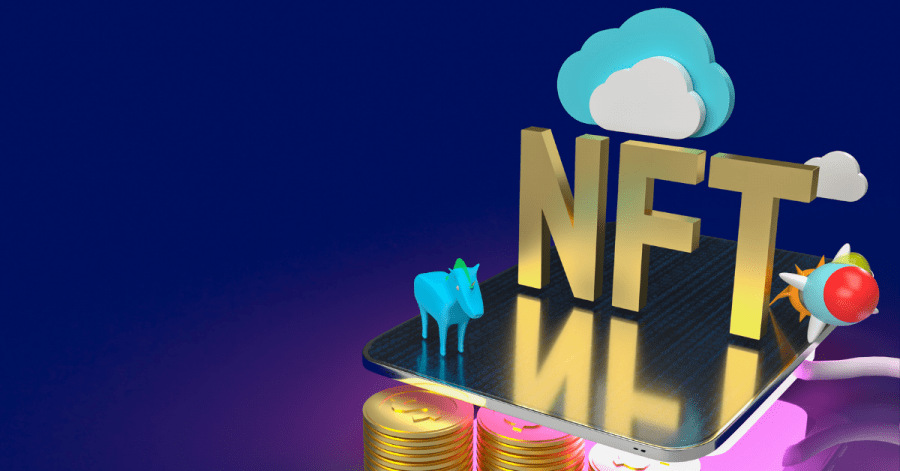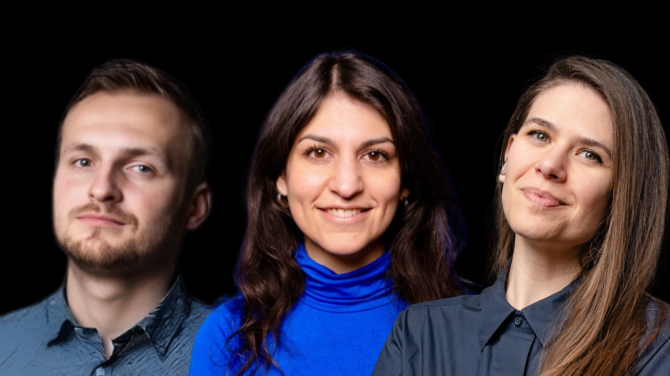Non-fungible tokens (NFTs) present an increasing opportunity for startups and companies to generate new revenue streams, whether by creating new business models, extending the value of their products and services, or entering new markets and finding new potential customers. At the same time, they have become an attractive source of investment, providing the means to finance new projects.
Although NFTs have first been traded back in 2017 on the OpenSea marketplace, their sales have only recently skyrocketed from $8M in January 2021 to $95M in February. By the end of 2021, the market exploded to $41 billion, almost catching up with the traditional art market. Thanks to encryption, NFTs are both scarce and verifiable; add to that the many shapes they can take, from tweets to articles, digital artwork, and even real estate property, and you’ve got an appealing investment opportunity, which extends beyond art collectors.
Recent announcements by social media behemoths like Twitter and Meta are further adding to the growing accessibility and visibility of the NFT market. Earlier this year, Twitter brought NFTs to social media for the first time by allowing users with a Twitter blue subscription and an iOS device to add a token-linked NFT to their profile pictures. Now Meta is planning to bring NFT integration to Instagram sometime in the near future, with Zuckerberg hinting that it may be possible to mint assets there.
As more and more news of startups launching NFT projects has reached our ears, The Recursive had a look at key use cases seen in Southeast Europe so far.
For more details on how NFTs can drive the next evolution in brand engagement, make sure to check our guidelines, with key insights from Volen Tsolov, Chief Operating Office at Glozal, a music tech company that develops the world’s first NFT Player™.
Startups with NFT projects in the region
Wellness, sports, and healthcare
In Romania, a team led by founder Calin Perpelea announced the launch of a social network dedicated to sports and healthy lifestyle enthusiasts, with plans to reach into the crypto, NFT, and metaverse spaces. The FITY platform brings together fitness and nutrition specialists, and offers personalized training, diet plans, and live-streamed workouts.
In the second quarter of 2022, FITY will launch a collection of 1000 NFTs on the Elrond blockchain. The NFT project will address two key audiences, serving two main purposes: to address a wider range of clients, and appeal to new generations in particular, and as a new financing source for the company. Calin Perpelea further explains:
“We have created this business as a self-sustaining ecosystem and the only way to do it was through blockchain. The smart contract will allow us, on the one side, to create coins as a reward for customers inside the platform and to reward investors through a staking system, and, on the other side, to burn coins whenever a trade with coins or NFTs is made. The coin quantity will always be ~20 million coins.
Customers will enjoy their lifetime benefits in the application, while investors are financing the project, which will be reflected also in the return of their investment. The NFTs also have a 3% royalty fee, funds redirected to product development and coin burning.”
In 2021, the founders invested 55K euros in the development of the platform, marketing, and branding. By 2022, 245K euros will further be invested in the integration of blockchain technology, the development of the FITY token, and the NFT collection. Part of the money will go to the integration with Fitbit and Garmin, and the development of a VR streaming system.
“In the end it is a win-win situation. We get funds to improve our product and to get a better reach. At the same time, the platform will reward the user for their efforts, reward the investors, and also self-adjust in terms of the number of coins, so that the business can grow naturally,” he adds.
Elsewhere in the wellness and healthcare sector, Romanian startup SanoPass also announced its plans to enter the blockchain and NFT space, starting with a collection of 10K health utility NFTs, to be traded on the Elrond blockchain starting April 1st.
Through its platform and subscription services, SanoPass connects companies and individuals with clinics for preventive medicine and fitness companies.
Each NFT contains a bundled subscription, therefore extending the company’s products and services. Owners will receive 10 consultations of general and internal medicine, and access to 100 fitness workouts, telemedicine services, and an AI-powered symptoms checker.
Another project, this time in the sports sector, that aims to use NFTs comes from North Macedonian football club K-Club NFT. The club wants to bridge football operations with Web 3.0, and empower football supporters with access to exclusive experiences in the football world.
The goal is for the future NFT holders community to invest their own fair share into the club’s lineup capital, and profit directly from the surplus budget. To safeguard the club’s prosperity, the club pledges at least 80% of all NFT earnings as reinvestment. NFT owners can also get involved in decisions regarding transfers and training and can access a large network of club owners, sporting directors, trainers, top-tier scouts, and managers.
Tourism and entertainment
Greek startup Cloudkeys further implemented the first NFT application in the tourism industry, combining digital assets with physical experiences to create value for both tourists and businesses.
In the past three years, Cloudkeys has been offering 360 management for vacation rental properties in Athens. Recently, they launched a collection of 10 NFT travel packages, giving tourists the opportunity to visit and experience Greece in a personalized way. The NFTs were traded on the Ethereum blockchain, with help from omgdrops.
“Those who buy this first NFT trip, will have the opportunity for a special tour in Greece, in a unique way but which describes the future is here to stay and change everything we knew,” said at the time Gifts Pavlido, co-founder of Cloudkeys.
Instead of a ticket to travel, Romanian startup Oveit offers event tickets, also integrating blockchain technology and tokenization. The company, now based in Texas, US, started with solutions for cashless payments, access control, and registration to events.
In 2021, they added a commercial solution, Streams.Live, which allows retailers and brands to create live shopping events. To power quick transactions on Streams.Live, they have partnered with Polygon Studios and are using their L2 blockchain solution.
Now Oveit also enables event organizers to create digital and tokenized tickets, with their preferred art style, to be stored in a digital wallet and resold.
“We plan on growing the market for NFT tickets and making it simple for any event maker to create and sell NFT tickets. At the same time we plan on further extending our live NFT sales support, and on launching a way to help our creator community grow with us,” co-founder Mihai Dragan shared with The Recursive.
Marketing and media
Another NFT drop is expected from Humans.ai, who announced they are working on a library of 10K uniquely synthetic voices, each of them embodying different tonalities, pitches, and ways of expression. This project is part of the startup’s efforts to make NFTs and blockchain more personalized and human-like, using AI:
“This can be related to the identity of the person that is using the blockchain. For example, you can use a voice as an identification for the blockchain. We are also considering attaching a talking head or a face to the NFT, among others,” Nicu Sebe, Head of AI at Humans.ai was sharing in an earlier interview.
The company already has a collection of Heart Beat NFTs, representing a symbiosis between humans and machines. They also carry the proof-of-human concept that helps recognize ownership and control the use of the asset within the synthetic media market ecosystem that Humans.ai is creating.
Real estate
Finally, last year we reported on another first in the emerging NFT marketplace: the auction of an apartment as an NFT by Bulgarian-founded real estate blockchain startup Propy.
Back in 2017, they also made the first-ever real estate transfer on the blockchain, a one-bedroom apartment in Ukraine sold to TechCrunch’s Michael Arrington through a small contract on the Ethereum blockchain. The same apartment was later sold as an NFT for ~$93,430.
The real estate market is ideal for blockchain applications, as it can solve the issues of traditional property ownership transfer: lengthy processes, paperwork, and high costs. To further support and manage the application of NFTs, Propy is working on homeownership transfer for entire homes, as well as fractions, co-founder Nataliya Karayaneva shared with The Recursive at the time.
. . .
This is only the beginning of our mapping of startups with NFT projects or collections in Southeast Europe. Should you know another project that fits on the list, drop us a message at [email protected].








